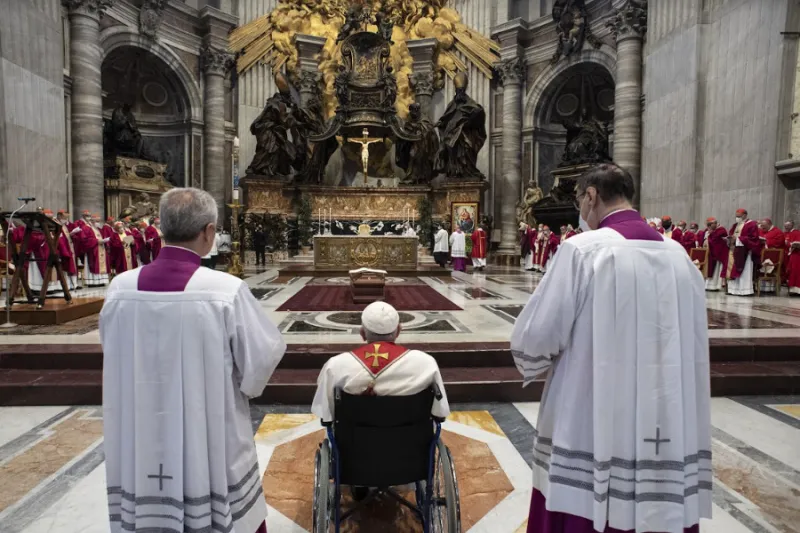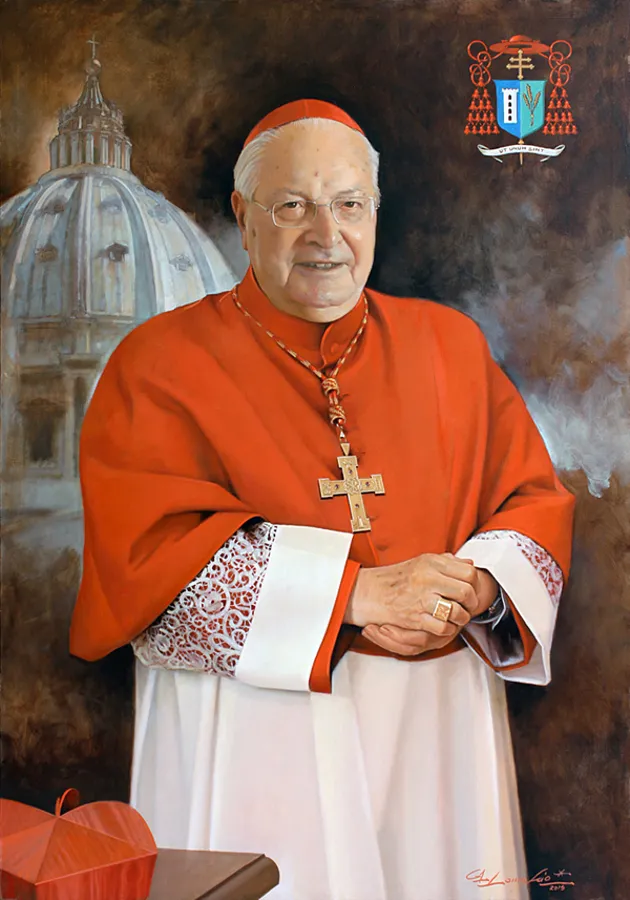
Vatican City, May 31, 2022 / 06:30 am (CNA).
Pope Francis on Tuesday attended the funeral Mass of the former Vatican Secretary of State Cardinal Angelo Sodano.
Cardinal Giovanni Battista Re, the dean of the College of Cardinals, presided at the ceremony in St. Peter’s Basilica on May 31.
Photographs showed the 85-year-old pope seated in a wheelchair as the Mass was celebrated at the Altar of the Chair.
The pope led the rites of final commendation, reported Vatican News, the Holy See’s online news portal.
Sodano, an influential Vatican diplomat who served as dean of the College of Cardinals until 2019, died on May 27 at the age of 94.
He had contracted pneumonia after being infected with COVID-19 and was hospitalized from May 9 at Rome’s Columbus Hospital.
In his homily, Re recalled Sodano’s decades of service to the Church.
“In his long years of service to the Holy See, Cardinal Sodano firmly believed in Christ and followed Him faithfully, serving Him with love and dedication to the Church and His Vicar,” Re said, according to Vatican News.
He praised the cardinal’s “gifts of intellect and heart, his sensitivity to the pastoral aims of the Church’s action in the world, his wisdom in assessing events, and situations and his readiness to help, seeking appropriate solutions in every case.”

Angelo Raffaele Sodano, the second of six children, was born in 1927 in Isola d’Asti, northwestern Italy.
He was ordained a priest in 1950 and spent almost 10 years teaching dogmatic theology in the diocesan seminary before being called to serve in the Vatican’s diplomatic corps.
Sodano was nuncio to Chile from 1977 to 1988. He also worked in the nunciatures in Ecuador and Uruguay.
In 1988, Pope John Paul II summoned him to the Vatican to serve as Secretary of the Council for Public Affairs of the Church. After the Vatican constitution Pastor bonus came into force, Sodano was named Secretary for the Relationship with States.
He became Pro-Secretary of State in 1990. A year later, he was named Secretary of State and a cardinal.
Sodano retired as Secretary of State in 2006, after leading the powerful curial office under both Pope John Paul II and Pope Benedict XVI.
At the funeral, Cardinal Re said: “In the nearly 16 years that he was the pope’s first collaborator, he worked with competence and dedication on behalf of peace.”
Following John Paul II’s death in 2005, Sodano was elected dean of the College of Cardinals. In that role, he preached at the Mass in 2013 before the conclave that elected Pope Francis.
Addressing his fellow cardinals, he said: “My brothers, let us pray that the Lord will grant us a pontiff who will embrace this noble mission [of charity] with a generous heart.”
The cardinal’s final years were overshadowed by allegations that he covered up sexual abuse by Legionaries of Christ founder Marcial Maciel, former U.S. Cardinal Theodore McCarrick, and others. Sodano’s name was mentioned 30 times in the McCarrick Report, published in 2020.
Juan Carlos Cruz, a clerical sex abuse survivor from Chile and member of the Vatican’s Pontifical Commission for the Protection of Minors, wrote on Twitter on May 28, that Sodano “did so much harm to so many people and covered up years of abuse in Chile and the world.”
Pope Francis accepted Sodano’s resignation as dean of the College of Cardinals in 2019, while establishing a five-year term limit for cardinal deans, who previously held the position for life.
The pope paid tribute to Sodano in a telegram on May 28.
“I recall his diligent work alongside so many of my predecessors, who entrusted him with important responsibilities in Vatican diplomacy, up to the delicate office of Secretary of State,” he said.
“In the Roman Curia, he carried out his mission with exemplary dedication. I, too, was able to benefit from his gifts of mind and heart, especially during the time when he exercised the office of Dean of the College of Cardinals.”
“In every assignment, he showed himself to be an ecclesially disciplined man, an amiable pastor, animated by a desire to spread the leaven of the Gospel everywhere.”
“I raise to God the Merciful Father prayers of suffrage for the late cardinal, that he may receive him into eternal joy.”
If you value the news and views Catholic World Report provides, please consider donating to support our efforts. Your contribution will help us continue to make CWR available to all readers worldwide for free, without a subscription. Thank you for your generosity!
Click here for more information on donating to CWR. Click here to sign up for our newsletter.




Lord have mercy on him.
Farewell to Cardinal Angelo Sodano. Eternal rest grant unto him O Lord and let your perpetual light shine upon the departed soul.